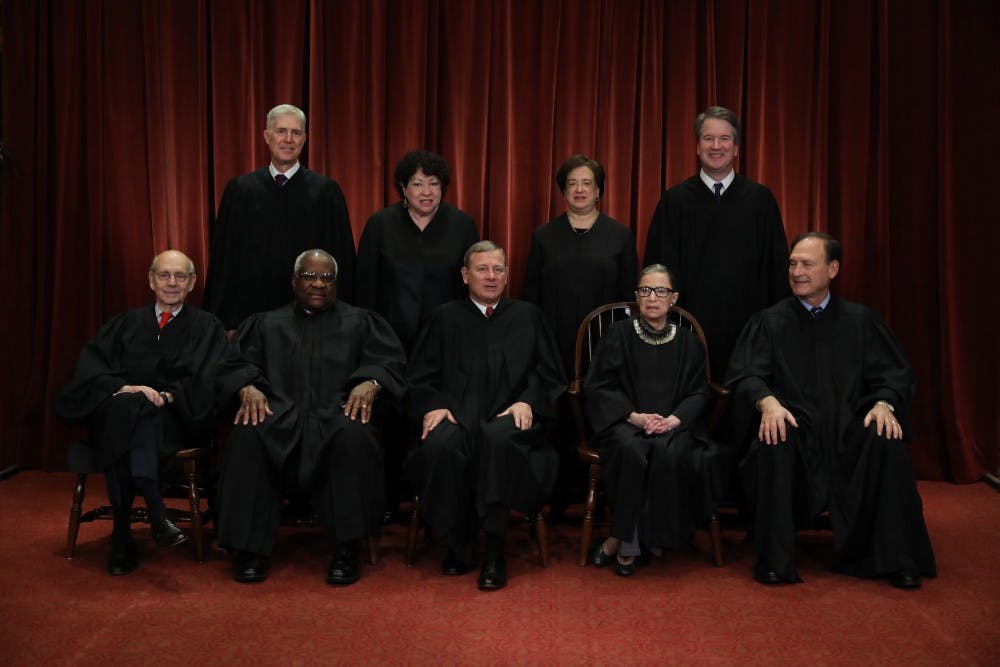Much of America was surprised last week when the Supreme Court in a 5-4 decision decided not to be total racist monsters and gut the Voting Rights Act of 1965.
Chief Justice John Roberts, normally the chief ghoul of the Supreme Court, wrote in the majority opinion that the Republican-dominated state legislature of Alabama had violated the VRA by drawing legislative maps that disadvantaged Black voters. National Public Radio — and they were far from alone in this — said the Court “unexpectedly” upheld provisions prohibiting racial gerrymandering. Unexpectedly.
That should tell you everything you need to know about the reputation of the Court, a body of which 59% of Americans disapprove. And that shouldn’t be surprising. After all, of the nine unelected justices, five were appointed by presidents who did not win the popular vote.
The American people can only take so many lies about living in a democratic society.
A 2021 survey from the Annenberg Public Policy Center found that 34% Americans would support abolishing the Supreme Court altogether. One can only hope that figure continues to grow.
When I tell most people that I don’t think the Supreme Court should exist they give me a funny look. It’s apparently a radical idea to disempower nine unelected reactionaries who leech off the American taxpayers they oppress for life.
[Related: OPINION: We must have democracy in the workplace]
And I cannot stress enough that the people who stripped millions of Americans of abortion rights were unelected. The people who enabled corporations to spend unlimited funds on elections were unelected. The people who gave George W. Bush — who did not win the popular vote — the presidency in 2000 were unelected.
Moreover, somewhat overlooked last week because of the “unexpected” VRA decision was an 8-1 ruling in which the Court determined Glacier Northwest Inc. could sue union workers for damages incurred during a strike. Eight unelected, bourgeois, robe-fetishists have once again ruled on behalf of the capitalist class against the workers, this time imperiling the right to strike.
That last decision should put to rest the liberal delusion of simply changing the make-up of the court, so to speak, by putting the “right” people in position. They rail against the conservatives on the court, and rightly so — they are, after all, nasty individuals, plagued by sexual assault allegations, religious fundamentalism, rampant homophobia, the list goes on.
But as we see with the union case, only Ketanji Brown Jackson sided against the capitalists. The liberals of the court have often been unreliable at best when it comes to social justice. One need only look to egregious decisions like Exxon Shipping Co. v. Baker, or Kelo v. City of New London, in which one or more liberals sided with corporate interests that hurt everyday Americans.
Opponents may come up with counter examples. Did the Court not originally legalize abortion, and the right of gay marriage? The fact, however, is that a country committed to democracy would not allow an unelected body this much power. The Court itself is the problem. Those counterexamples were good decisions, but they too, were illegitimate because they were not democratically made.
What a backward country to leave the fates of minorities to the capricious whims of unaccountable conservatives! Other countries don’t have these pitfalls. The U.K. Supreme Court, for example, doesn’t even have the power to strike down legislation passed by Parliament.
Perhaps you’re on board with abolishing the court — it’s toxic, reactionary and undemocratic. But how would the abolishing be done? Is it even constitutionally possible?
My guess is probably not. I scoured the internet searching for answers to these questions only to find very little. Doing away with the Court is apparently outside reasonable public debate. Socialists like myself favor abolition, and I’ve seen libertarians voice support for getting rid of the Court as well, but how this would be done within the current legal framework is unclear.
If it is unconstitutional for Congress to pass a law abolishing the Court, which I suspect it is, then we are faced with another question at the very root of the problem: what if we got rid of the constitution, too?
[Related: OPINION: The United States has never been a democracy]
Once again, I’m sure you think I’m not thinking about things seriously. But it’s not as if the current constitution is a good one. It was written hundreds of years ago by slave-owners, featuring numerous defects — electoral college, slavery-via-punishment, etc. — and it’s notoriously difficult to amend.
We could write a new and better one, one that doesn’t give extraordinary power to an undemocratic Supreme Court. You might think the odds of this happening are slim but look around — it’s not as if the current system is producing a lot of positive change. Even the most tepid reforms require the moving of mountains. The current activist approach of piecemeal reformism is not working.
Let us be bold. Let us get rid of the Supreme Court. And if the constitution says we can’t, let’s get rid of that, too.
Jared Quigg (he/him) is a senior studying journalism and political science.




